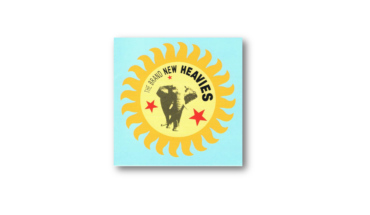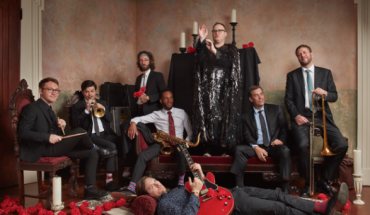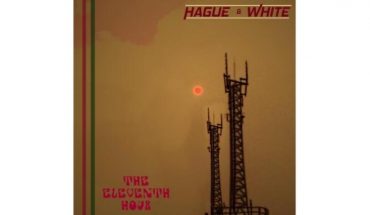They both possess the becalmed, faraway look of people recently freed, the future stretching out before them as would a soft carpet that welcomes their careful, untrammelled tread. Having recently parachuted out of the Brand New Heavies to form Music For Robots, Jan Kincaid – the man who gave the Heavies their backbeat from 1990 – and vocalist Dawn Joseph now find themselves in a much healthier and creative frame of mind.
Today, Jan’s mood is philosophical. We’re perched high above London as the dying sun of early evening rakes the top floor of a West End hotel. “Dawn and I left the band within weeks of each other,” he says, “and it was absolutely the right time to leave the Heavies at that point. I felt trepidation before leaving, but when I finally did I had no regrets. Making this record, Music For Robots, was a free experience. We recorded it at home, in Sweden with my brother, did the drums at a friend’s place, laid down the horns in one of the horn player’s studios, mixed it in a bigger studio… it all came together through people we know.”
Cutting the ties that bind can discombobulate and halt the passage of creative souls, but time had run its course for this duo. With Heavies standards like ‘Dream Come True’, ‘Stay This Way’ and ‘Never Stop’ under their belts, a phlegmatic approach to the future was called for. “Dawn and I wanted to spread our wings creatively, and I’d been in the Heavies for a long time and it had got to the stage where being in the band had turned into a boring marriage.”
Kincaid’s brother Per played bass on several of the tracks, with other musicians including Naz Adamson (bass), Mark Beaney (guitar), Graeme flowers (trumpet) and Andy Ross (sax) contributing. This eponymous debut LP (its name being a subtle dig at today’s music world) is crammed with the exuberance of new beginnings, the 14 tracks revealing the duo’s love of the old – be it the shadings of The JBs, Edwards and Rodgers, Motown, mid-’70s Blue Note or the Chicago of Leroy Hutson – while delivering a sound wholly contemporary. It’s a sound that cheers, Dawn’s voice weaving through it all with a recaptured passion.
“For us, the Heavies weren’t going anywhere. There was no mystery left. Communication was breaking down and people were doing it for the wrong reasons. It was about a lot of things other than music and so it wasn’t really moving forward. Dawn joining the band was the best thing that had happened to it for a long time. She helped rejuvenate the Heavies. We had started to do some great shows with Dawn, but despite this, the drive was missing.
“Dawn and I were naturally writing together and it really flowed well between us. Music should be exciting and things should always be moving forward, but the Heavies had a formula and the formula had got a bit tired.”
“In a way we were forced into it,” adds Dawn, who started out with Phil Collins’ band and has sung with acts as diverse as Kylie Minogue, Michael McDonald and CeeLo Green. “I’d joined the Heavies when they were just finishing the ‘Forward’ album, then I started writing lyrics, which was something that was more easily done with Jan, but by then the rest of the band didn’t want us to do it. But we’d realised we connected when we started writing together.”
“We started writing more or less straight away,” says Jan. “We were working without any boundaries and were writing stuff that didn’t really fit into the Heavies’ remit. We’ve tried to make the record the best we can. We’ve got a distribution deal with the album, but we still own the rights to the record. It gives us a lot of freedom. There’s no point in making music if you don’t want people to hear it. Part of my drive is to express myself and I want people to share in that, particularly when you think you’ve made something good.”
Is there a shifting line up for the forthcoming gigs? “We have a collective,” says Jan, “because it makes sense to have options. We’re just putting together some gigs with an agent here and an agent in the US. Our plan is to do as much as we can on the road which we both really enjoy doing. It’s a great job getting around and playing in front of an audience.” Dawn agrees: “When we step out on stage to a room full of people, we respond to their energy. They’re escaping from whatever negativity they’ve got going on in their lives and, for that hour and a half, they’re in the zone.
“But only now do I find that I’ve graduated from the school of music,” she adds, “because I’ve put all my experience and learning into growing and writing. Now I am bursting with ideas that I want to get out.”
Jan too possesses a drive and an understanding of how the music business works as only a man of experience can. It’s a honed, professional focus that has no time for the brooking of bullshit. “I think energy is a big part of things. If you’ve been in a band for a long time, then there are patterns of behaviour that have been formed that can be restrictive. But music is still a massive part of my life. And Dawn’s. Music can express things that a lot of the time I can’t say, and that’s magical. I’ve always been susceptible to that. Music is how I engage with the world. There’s a part of you that never stops learning, which can mean listening to current music and music that you’ve never heard before.”
His musical partner nods. “I’m always looking for new things,” she says. “I listen to a lot of country, because it’s solid. The songs have great lyrics, melodies, it’s believable because the artist has probably lived it, but when I listen to a lot of pop or so-called R’n’B, I feel let down a lot of the time because I’m always comparing it to the old stuff. An old record will satisfy me, but you’re taking a gamble listening to a lot of the new stuff. Lyrically it’s not as good and I don’t feel any emotion listening to it.”
“There are a lot of marketing led artists out there and they’re all generic,” adds Jan. “They’re polished, with no edge. The production line side of pop music has never before been this bad. There are a thousand singer-songwriters but they’re all sounding the same. It’s boring. There’s nothing that really blows me away right now. Back in the day when I was growing up in London there was the tribal thing, with soul boys, mods and punks, but you don’t have any of that anymore, which is partly the reason there is no real fashion link to music.”
It could perhaps be argued that today’s youth movement, confused by the chaff thrown out by the new media, moves as a compliant herd, tribalism be damned, afloat in the balm and perceived safety of the leaderless crowd. But if that isn’t the case now, the danger is that this may yet come to pass.
“Fashion, like music, is so generic now,” says Jan, “but younger people are definitely looking around for something to latch onto, be it a scene or a look, but it’s not there. Maybe there’s grime, but not much else. I mean, Paloma Faith is as quirky as it gets in the mainstream at the moment.”
But Jan is not without admiration for modern players, despite bemoaning the flattened perfection of modern records. “Nate Smith as a drummer is one to watch and admire. He’s a bad boy, with a link between the old and the new. I’ve always liked James Gadson too. I like good taste, but there’s too much fireworks with young drummers today, whereas I think a drummer should be all about light and shade and accompaniment, and being the engine room of a track.
“But mediocrity has become the norm,” he says, “and it’s in everything. But that doesn’t mean what people want has changed… it’s just what they’re given. Maybe we were spoilt for choice when we were young, but I still want to hear music that excites me, and I have no time for regrets. You can only learn from the stuff that isn’t great, and then move on.”
Jason Holmes
@JasonAHolmes
Music For Robots will be released on 4 May on Membran Music, and the band will be playing 229 Club in London on 25 April





